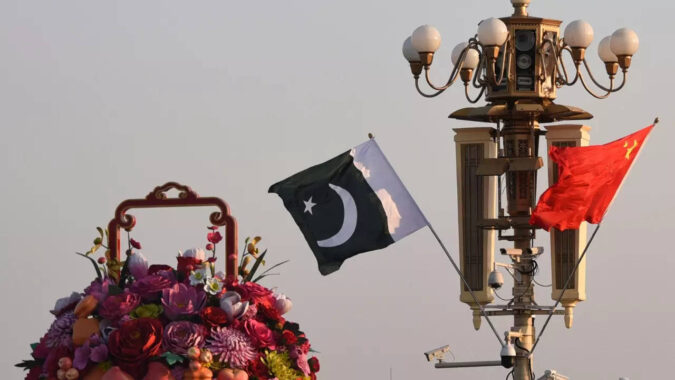However, it appears that the ties between the so-called all-weather allies are now navigating through choppy waters.
Pakistan’s worsening security situation has become a matter of great concern for Chinese officials while its financial crisis has put Beijing’s massive investments at risk.
The sentiment is similar in some parts of Pakistan, where officials are secretly blaming the mega CPEC (China Pakistan Economic Corridor) project for exacerbating the country’s debt crisis. The CPEC is a $65 billion network of roads, railways, pipelines, and ports in Pakistan connecting China to the Arabian Sea.
Is the “iron brotherhood” between China and Pakistan finally crumbling? These recent examples suggest so …
Closure of Chinese consular section
China recently announced that it will be temporarily closing down the consular section of its embassy in Pakistan due to “technical issues”.
The move comes just days after China advised its citizens in Pakistan to be cautious of the deteriorating security situation in the country.
In a notice issued last week, the Chinese ministry of foreign affairs’ consular department warned their citizens that they may be at risk of high levels of security in the country, Geo News reported.
China, which did not vacate its diplomatic missions in Kabul even during the Taliban takeover in 2021, clearly appears to be nervous about the failing security and financial situation in Pakistan.
Rising terror
Unlike the time when Pakistan exclusively used terrorism as a tool of its state policy, it is now facing a different kind of challenge.
There’s been a spike in terror attacks, particularly since the TTP — Tehreek-i-Taliban Pakistan — called off a truce with the government late last year.
Pakistani Taliban target Pakistan’s military and security personnel with the aim of establishing the rule of Shariat as interpreted by their Afghan counterparts.
These attacks have rattled an already jittery China.
Various militant groups in Pakistan have been frequently targeting Chinese nationals working on CPEC, aiming to threaten a major segment of Beijing’s Belt and Road infrastructure initiative.
China has been pressing Pakistan to provide foolproof security to its nationals working in the country’s restive regions.
However, the government in Pakistan’s Punjab recently told Chinese nationals residing in the province that it will not provide security to all of them and asked them to hire private security firms for the purpose.
All this while, the Chinese nationals working on CPEC in Pakistan continue to live in fear.
A female suicide bomber last April killed three Chinese teachers in Karachi along with their local driver in an attempt to undermine a relationship on which Islamabad’s financial survival largely depends.
In another such major incident in July 2021, ten Chinese nationals, mostly engineers, were killed and 26 others were seriously injured after a suicide attack on a bus that was ferrying them to the work site of the Dasu Hydropower Project in Kohistan district of Khyber Pakhtunkhwa province.
The Balochistan problem
China’s increasing footprint in the tension-hit Balochistan region has also made matters worse.
Baloch activists are furious over Chinese aggression in their land and have frequently launched protests against their presence in the region.
The Baloch already live as a minority on their own land and face widespread persecution at the hands of the Pakistan army and spy agency, the ISI.
In recent years though, the separatist movement in Balochistan has intensified with opposition against Pakistan and its ally, China, growing by the day.
The Baloch have been resisting the massive Chinese investments, especially in the Gwadar area since it has led to a mass displacement of the indigenous population in the region. Many restrictions have also been placed on local fishermen because of the Gwadar port construction.
In recent years, the Baloch have targeted Chinese workers and destroyed public property to oppose Islamabad’s backing of Chinese investments.
Recently, a bomb blast, claimed by the Balochistan Liberation Army, derailed a passenger train in Balochistan’s Bolan district. Some 18 people were injured in the incident.
Many such armed outfits have emerged in Balochistan as they continue to target Chinese interests, becoming a constant headache for Beijing.
Stalled projects
Now, with Pakistan staring at dwindling forex reserves and a massive energy crisis, China is reluctant to show its largesse to its all-weather ally.
While China has pledged to help Pakistan every now and then, there is a clear hesitancy on the part of President Xi Jinping to interfere in the messy domestic political situation of Islamabad.
In fact, many Chinese companies in the crisis-hit country have remained reluctant to continue their projects due to delayed payments, rising exchange rates and the uncooperative behaviour of the state authorities.
China has delayed many of its crucial development projects in Pakistan including the Mainline-I railway project, the Karachi Circular Railway project, the Azad Pattan hydropower project and the Thar Block-I coal project.
Separately, China wants Pakistan to fulfil the International Monetary Fund (IMF) obligations in order to financially help Islamabad.
Meanwhile, the IMF has raised red flags over the CPEC projects in Pakistan, pushing the country into a catch-22 situation.
(With inputs from agencies)
